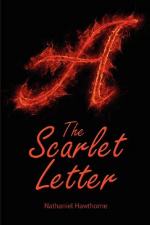The crowd was in a tumult. The men of rank and dignity, who stood more immediately around the clergyman, were so taken by surprise, and so perplexed as to the purport of what they saw—unable to receive the explanation which most readily presented itself, or to imagine any other—that they remained silent and inactive spectators of the judgement which Providence seemed about to work. They beheld the minister, leaning on Hester’s shoulder, and supported by her arm around him, approach the scaffold, and ascend its steps; while still the little hand of the sin-born child was clasped in his. Old Roger Chillingworth followed, as one intimately connected with the drama of guilt and sorrow in which they had all been actors, and well entitled, therefore to be present at its closing scene.
“Hadst thou sought the whole earth over,” said he looking darkly at the clergyman, “there was no one place so secret—no high place nor lowly place, where thou couldst have escaped me—save on this very scaffold!”
“Thanks be to Him who hath led me hither!” answered the minister.
Yet he trembled, and turned to Hester, with an expression of doubt and anxiety in his eyes, not the less evidently betrayed, that there was a feeble smile upon his lips.
“Is not this better,” murmured he, “than what we dreamed of in the forest?”
“I know not! I know not!” she hurriedly replied. “Better? Yea; so we may both die, and little Pearl die with us!”
“For thee and Pearl, be it as God shall order,” said the minister; “and God is merciful! Let me now do the will which He hath made plain before my sight. For, Hester, I am a dying man. So let me make haste to take my shame upon me!”
Partly supported by Hester Prynne, and holding one hand of little Pearl’s, the Reverend Mr. Dimmesdale turned to the dignified and venerable rulers; to the holy ministers, who were his brethren; to the people, whose great heart was thoroughly appalled yet overflowing with tearful sympathy, as knowing that some deep life-matter—which, if full of sin, was full of anguish and repentance likewise—was now to be laid open to them. The sun, but little past its meridian, shone down upon the clergyman, and gave a distinctness to his figure, as he stood out from all the earth, to put in his plea of guilty at the bar of Eternal Justice.
“People of New England!” cried he, with a voice that rose over them, high, solemn, and majestic—yet had always a tremor through it, and sometimes a shriek, struggling up out of a fathomless depth of remorse and woe—“ye, that have loved me!—ye, that have deemed me holy!—behold me here, the one sinner of the world! At last—at last!—I stand upon the spot where, seven years since, I should have stood, here, with this woman, whose arm, more than the little strength wherewith I have crept hitherward, sustains me at this dreadful moment, from grovelling down upon my face! Lo, the scarlet letter which Hester wears! Ye have all shuddered at it! Wherever her walk hath been—wherever, so miserably burdened, she may have hoped to find repose—it hath cast a lurid gleam of awe and horrible repugnance round about her. But there stood one in the midst of you, at whose brand of sin and infamy ye have not shuddered!”




